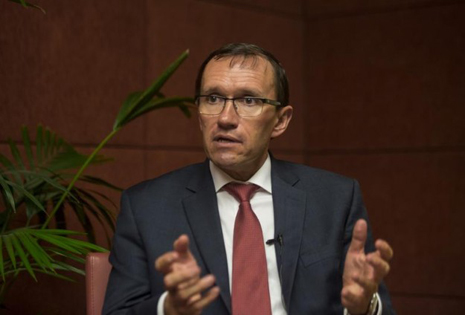"I want to say that it is the best opportunity in many years. I think the leaders of Cyprus know that and they want to use this opportunity," Eide told Anadolu Agency on Thursday.
"We know how both leaders work really well together. It has really transformed the atmosphere of the talks. We have been sitting together and discussing all key issues," he said.
About his role in the process, he said: "My primary task is to assist the leaders in their negotiations. The leaders need each other to succeed. There is only a joint success. There is no individual success".
Eide said that the circumstances surrounding Cyprus were very different. "There is the Syria security crisis in the neighborhood and there is also an economic crisis which affects Greece and also Cyprus. I think people understand that the cost and risks involved in not solving the Cyprus problem are bigger than they used to think," he said.
He also said that a lot of Cypriots were tired of the crisis. "They are aware that there is an opportunity cost of not solving the problem," he said.
If the settlement was achieved, he believed that both economies would fare much better and geopolitical risks would also fade away.
About the issue of natural resources in the island, Eide said: "There was a deep disagreement on how to deal with this in the present, while there was already an agreement about how to deal with it in the future in case of an settlement".
The Greek Cypriot administration had unilaterally launched exploratory drilling activities for oil and gas in the Eastern Mediterranean despite strong opposition from the Turkish-Cypriot side, which argued that the island`s natural resources should be exploited jointly in a manner that ensured the equal and inherent rights of both peoples over the natural resources were not undermined.
"With the settlement, I think Cyprus will have unique opportunity not only to capitalize the natural wealth of the ocean around it but also work with all neighbors, including Turkey, Egypt, Israel, Lebanon, whichever country they like," Eide added.
"Because by that time a unified Cyprus would have normalized relationships with all these neighbors. Eastern Mediterranean oil-and-gas reserves can be developed in a cooperative manner," he added.
Political tensions in the long-divided island have eased since full-fledged talks resumed May 15.
On May 28, Turkish Cypriot President Mustafa Akinci and Greek Cypriot leader Nicos Anastasiades met at the UN`s Good Office on the island, hosted by Eide. During their talks, Turkish Cypriot and Greek Cypriot leaders had agreed on a five-step plan to resolve the Cyprus issue.
The steps included opening more crossing points, interconnecting the power grids, allowing mobile phone interoperability on both sides of the island, resolving the issue of radio frequency conflicts, and forming a joint committee on gender equality on Cyprus.
The Greek Cypriot administration had unilaterally suspended the talks last October after Turkey issued an advisory on behalf of the Turkish Republic of Northern Cyprus for seismic research off the coast of Cyprus.
The island was divided into a Turkish Cypriot government in the northern one third and a Greek Cypriot administration in the southern two-thirds after a 1974 military coup by Greece was followed by the intervention of Turkey as a guarantor state in Cyprus.
More about:
















































